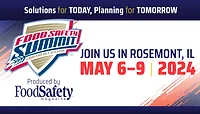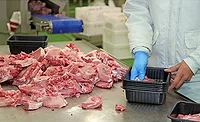Besting the Pests: Education is Key to Successful IPM at Retail
Across the U.S., insects and rodents cost food manufacturers and retailers billions of dollars and thousands of customers. According to Kim Kemp, Manager, Food Safety Extended Enterprise at Nestlé Purina, the best way to best the pests is to help food retailers become more aware of regulatory issues in food safety and pest management, build awareness in sanitation and reduce product reclamation costs.
"Educating is what good vendors do," says Kemp. "Our objective is not just to sell food retailers the best pet food in the world, but also to help them take care of it all the way to the consumer's experience."
Since 1998, Nestlé Purina, which operates 26 pet product manufacturing facilities worldwide, including eight in the U.S., has made that educational opportunity a reality for the nation's largest mass merchandisers and grocers. The company just co-hosted, with Copesan, its ninth Food Safety Symposium in September 2002, where employees from the nation's largest food retailers learned from the leaders in food safety, sanitation and pest management industries. Kemp states that growth in attendance--from eight retail food safety professionals at the first meeting, to more than 100 attendees from quality assurance, food safety and sanitation teams, retail and distribution operations, loss prevention teams, and pest management programs at the most recent event--is indicative of a growing awareness at the retail level of a "knowledge gap."
"Many in our target audience come from superstore retail formats. Just a few short years ago these companies were selling blue jeans and bicycles and now they are major players in the food business," Kemp explains. "That is quite a learning curve in terms of food safety and sanitation issues. We find that their participation grows annually."
Bridging the Knowledge Gap Creates a Forum for Change
Nestlé Purina's initial impetus to assist its retailers with improving their pest management and sanitation efforts sprung from an analysis of customer complaints received on the company's 800-number line, which is printed on all of its pet food product packaging. A "huge amount" of calls are received on the 800-number, notes Kemp, which allows the company a highly sophisticated retail tracking system that can monitor what is happening to product in virtually every retail environment in America, from gas stations and convenience stores, to grocery stores and supercenters.
Of the calls reviewed, he says, "We sifted through those that were complaints and found that pest infestation was the number one complaint, and in many cases, it was four times higher than the next recorded complaint against our top brands. Next, we took our top 10 customers by volume and our top 10 customers by infestation complaints, grafted these together and got some very interesting spikes. The spikes told us that this was not a pet food issue; this was a sanitation issue at individual retail operations. We found that some of our retailers didn't have an issue with their pet food aisles, while others had significant issues with infestation complaints with different products."
Since the infestation problems were not originating at the manufacturing plant, the challenge for Nestlé Purina became "how to influence our number one customer complaint when it was not inside our actual boundaries to control," adds Kemp. "We decided to identify our key retail accounts, identify any training and education needs that they may have had relative to this issue, and organize a symposium to address those needs. Since then, the nine symposia that we've held to date have shown there is a huge need for education about pest management and sanitation at retail. There's a void, if you will, at the retail level about what to do, how to do it, and what to look for and why."
The Nestlé Purina symposia bring together manufacturers, retailers, regulators and pest management companies to create a forum for information exchange--and change. For example, the participation of Copesan, the nationally known alliance of regional pest management companies, as a co-host of the event offers retailers the opportunity to find out what they should expect from a pest control company--"the single biggest disconnect in the industry," according to Kemp.
"Miscommunication about what the pest control companies are supposed to do versus what they actually do often causes a 'keystone cops' situation, where the retailer waits to call the professionals after the infestation problem is totally out of control and expects it to be fixed instantaneously. In crisis management, there's very little time for a discussion as to the root causes of pest problems."
Nestlé Purina doesn't charge a registration fee for the symposium, adds Kemp, because educating its retailers about how to take care of Purina products in their environment relative to pest control and sanitation is a proven return on investment. "Since 1998, we've been tracking these numbers very closely, and by educating our retailers, we have reduced our infestation complaints by 50%. That number alone would pay for a lot of symposiums."
copesan.com
Looking for quick answers on food safety topics?
Try Ask FSM, our new smart AI search tool.
Ask FSM →








